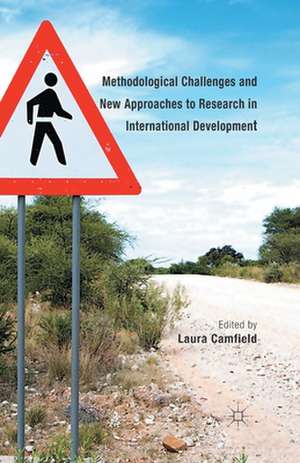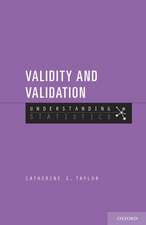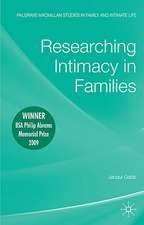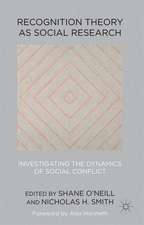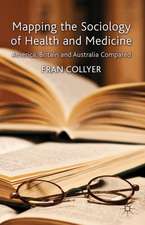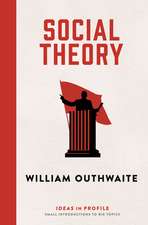Methodological Challenges and New Approaches to Research in International Development
Editat de L. Camfielden Limba Engleză Paperback – 2014
| Toate formatele și edițiile | Preț | Express |
|---|---|---|
| Paperback (1) | 390.08 lei 6-8 săpt. | |
| Palgrave Macmillan UK – 2014 | 390.08 lei 6-8 săpt. | |
| Hardback (1) | 396.78 lei 6-8 săpt. | |
| Palgrave Macmillan UK – 19 mai 2014 | 396.78 lei 6-8 săpt. |
Preț: 390.08 lei
Nou
Puncte Express: 585
Preț estimativ în valută:
74.65€ • 77.84$ • 62.04£
74.65€ • 77.84$ • 62.04£
Carte tipărită la comandă
Livrare economică 21 martie-04 aprilie
Preluare comenzi: 021 569.72.76
Specificații
ISBN-13: 9781349451272
ISBN-10: 1349451274
Pagini: 340
Ilustrații: XIX, 340 p.
Dimensiuni: 140 x 216 mm
Greutate: 0.46 kg
Ediția:1st ed. 2014
Editura: Palgrave Macmillan UK
Colecția Palgrave Macmillan
Locul publicării:London, United Kingdom
ISBN-10: 1349451274
Pagini: 340
Ilustrații: XIX, 340 p.
Dimensiuni: 140 x 216 mm
Greutate: 0.46 kg
Ediția:1st ed. 2014
Editura: Palgrave Macmillan UK
Colecția Palgrave Macmillan
Locul publicării:London, United Kingdom
Cuprins
List Of Tables And Figures Acknowledgements Notes On Contributors 1. Introduction Laura Camfield 1.1. Background 1.2. Quality Of Research In International Development 1.3. Chapter Outlines 1.4. References PART I: RELATIONSHIPS 2. Ethics, Intimacy And Distance In Longitudinal, Qualitative Research: Experiences From Reality Check Bangladesh; Malin Arvidson 2.1. Introduction 2.2. Reality Check Bangladesh 2.3. The RCA Principles 2.4. Intimacy In Qualitative Research And In RCA 2.4. Intimacy And Competing Realms Of Ethics 2.5. Intimacy, Distance And Voice 2.6. Concluding Remarks 2.7. References 3. What's In It For Us? Consent, Access And The Meaning Of Research In A Qualitative Longitudinal Study; Rebecca Taylor, Malin Arvidson, Rob Macmillan, Andri Soteri–Proctor and Simon Teasdale 3.1. Introduction 3.2. Real Times: Project Methodology And Ethical Practice 3.2. The Literature: Access, Consent, Gatekeepers And Politics 3.3. Recruiting The Cases 3.4. Reflecting On Recruitment And Building Relationships 3.5. Discussion And Conclusions 3.6. References 4. Going Back To Re-Study Communities: Challenges And Opportunities; Graham Crow 4.1. Introduction 4.2. Problems In The Field 4.3. Conclusion 4.4. References 5. Taking A Wellbeing Approach To Fisheries Research: Insights From A Sri Lankan Fishing Village And Relevance For Sustainable Fisheries; Coulthard, S., Sandaruwan.K.L., Paranamana, N., And D. Koralgama 5.1. Introduction – Taking A Wellbeing Approach To Fisheries Research 5.2. A 3D Framework For Researching Wellbeing 5.3. Assessment Of Basic Human Needs 5.4. Exploring Needs And Establishing Thresholds 5.5. Governance Relationship Assessment (GRA) 5.6. Measuring Subjective Wellbeing – The 'Global Person Generated Index' 5.7. Linking Wellbeing To Fisheries Policy 5.8. References PART II: TIME AND CHANGES OVER TIME 6. Researching Social Change And Continuity: A Complexity-Informed Study Of Twenty Rural Community-Cases In Ethiopia 1994 – 2015;Philippa Bevan 6.1. Introduction 6.2. The Foundations Of Knowledge Framework 6.3. The WIDE3 Research Domain And Research Questions 6.4. Theory 6.5. Two Diachronic Frameworks 6.6. Research Strategy 6.7. Research Answers 6.8. Some Empirical Conclusions 6.9. The Stage 1 And Stage 2 Communities: Looking To The Future 6.10. References 7. Patterns Of Socio-Economic Mobility In Rural Bangladesh: Lessons From Life-History Interviews; Peter Davis 7.1. Introduction 7.2. Methods 7.3. Conceptualising Socio-Economic Mobility 7.4. Patterns Of Coping In Crises 7.6. Concluding Remarks: Learning About Poverty Dynamics From Life Histories 7.7. References 8. Household Surveys – Using Qualitative Data To Enhance Our Understanding Of Household Dynamics Over Time; Pamela Nasirumbi, Janet Seeley, And Sian Floyd 8.1. Introduction 240 8.2. Background To The General Population Cohort 8.3. Definitions Of Household And Family 8.4. 'The Household' In The GPC 8.5. Household Creation In The Ganda Society 8.6. Tracing Households 8.7. Tracing GPC Households 8.8. Comparison Of Our Findings With Those Of Other Studies 8.9. References 9. Using Qualitative And Panel Data To Create Durable Measures Of Child Poverty And Wellbeing Across Childhood; Keetie Roelen 9.1. Introduction 9.2. Mixed Method Approaches In Longitudinal And Child Poverty Research 9.3. Monetary And Multidimensional Child Poverty In Vietnam 9.4. Chronic Child Poverty In Rural Ethiopia 9.5. Discussion And Conclusion 9.6. References PART III: ANALYSIS AND REPRESENTATION 10. Epistemology And Ethics In Data Sharing And Analysis: A Critical Overview; Joanna Bornat 10.1. Introduction 10.2. What Do We Mean By Secondary Analysis, Re-Use Or Sharing? 10.3. Debates In Re-Use 10.4. Ethical Issues 10.5. Conclusions 10.6. References 11. Replication Of Quantitative Work In Development Studies: Experiences And Suggestions; Maren Duvendack And Richard Palmer-Jones 11.1. Introduction 11.2. Experiences With Replication In Social Sciences 11.3.Motivation For Replication 11.4. Prominent Examples In Replication In Economics 11.5. Modelling Incentives For Replication 11.6. Argument And Persuasion 11.7. Conclusions 11.8. References 12. Replicating 'Sources Of Slow Growth In African Economies'; Graham A. Davis 12.1. Introduction 12.2. Data Used To Explain Growth 12.3. Theoretical Background 12.3. The Problem Of Missing Countries 12.4. Policy Implications 12.5. Concluding Remarks 12.6. References 13. Reflexive Relations And The Contested Creation Of Epistemic Diversity In The Safe Motherhood Initiative; Dominique Béhague And Katerini Storeng 13.1. Introduction. Denouncing 'Evidence-Base Advocacy' 13.2. Roots Of Exceptionality 13.3. Theorizing The Boarders Of Normative Epistemologies 13.4. Early Historical Insight: The Comprehensive Agenda 13.5. The Public Health Lens: Identifying 'Modifiability' 13.6. Cost-Effectiveness And The Search For Political Clout 13.7. Defending Epistemic Flexibility 13.8. Interest In 'Context' 13.9. The Ethics Of Epistemological Power 13.10. References 14. Conclusion Laura Camfield 14.1. Defining And Measuring Poverty 14.2. Studying Poverty Over Time 14.3. Generating Evidence 14.4. Cross-Cutting Issues 14.5. Conclusion 14.6. References
Notă biografică
Malin Arvidson, Lund University, SwedenDominique Béhague, Vanderbilt University, USAPhilippa Bevan, Oxford University, UKJoanna Bornat, Open University, UKSarah Coulthard, Northumbria University, UKGraham Crow, University of Edinburgh, UKGraham A. Davis, Colorado School of Mines, USAPeter Davis, Independent Scholar, UKMaren Duvendack, University of East Anglia, UKSian Floyd, London School of Hygiene and Tropical Medicine, UKPamela Nasirumbi, Centre for Sexual Health and HIV Research at University College London, UKRichard Palmer-Jones, Independent Scholar, UKKeetie Roelen, Institute of Development Studies, UKJanet Seeley, University of East Anglia, UKKaterini Storeng, University of Oslo, NorwayRebecca Taylor, University of Birmingham, UK
